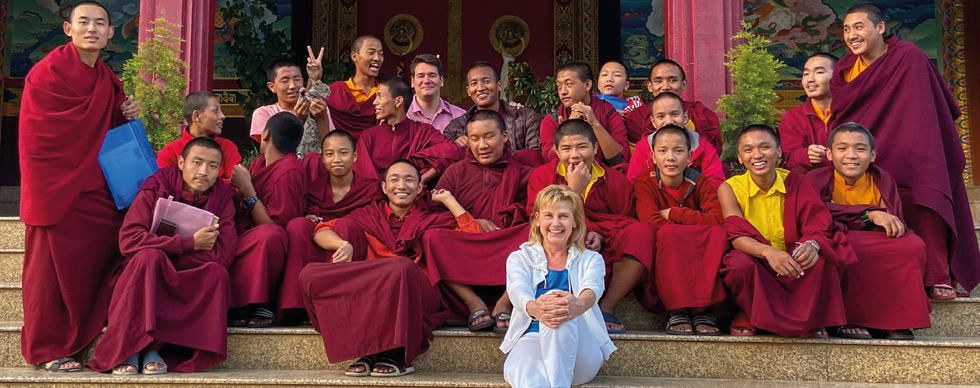Personal report of Maria Reinisch
Admittedly, I didn’t know exactly what to expect in Nepal. I was curious to learn something about the attitude of young people towards energy and the environment and to compare it with that of young people in Germany. Given the big differences between the two countries – and not just in the energy infrastructure – it was exciting to find out whether there were any similarities.
As part of the project, I had time to immerse myself in the different worlds of Nepal and the Nepalese. In Kathmandu you can feel the mixture of poverty, an infrastructure often destroyed by the earthquake in 2015 and enormous air pollution. Everywhere in the country you will find a deep and pragmatic religiosity. Hinduism and Buddhism live in peaceful coexistence in the numerous temples with their stupas and prayer wheels. In the barren world of the high mountains of the Himalayas and even more in the remote regions in the south, life often takes place without electrical energy, far away from the curse and blessing of urban civilization.
I was enthusiastic about the openness and curiosity that was shown to us and our energy topics and what ideas and discussions arose from it. It was fascinating to see how the children held a camera in their hands for the first time in their lives, how they started anxiously and then more courageously searched for their motifs and then curiously snuggled around me to look at the photos on the computer and to select.
A basic attitude of mindfulness and gratitude was felt everywhere, combined with an inner sense for the community and the “we” – not only in feeling, but even more so in action. Answers were first coordinated with each other and then performed in chorus. They were always attentive – whether listening, taking photos or assembling solar panels.
I especially took three things with me from Nepal: gratitude, mindfulness and a lively coexistence of people. In addition, dealing with nature and other people has always been full of respect and appreciation. In my view, people’s positive attitudes can be transferred to other areas. For the German energy transition, more constructive cooperation, understanding of the relationships and appreciation of the environment would be desirable.
The appreciation of energy and the environment changed among the students of the Heinrich Mann School in Neukölln during the project week. As soon as the young people actively deal with the topic of the energy transition, they came up with numerous ideas on how to use energy more consciously. They acted like mature citizens who see energy as valuable, as well as the nature and their own opportunities to change something.
The project made people aware of how much we can learn from each other. If we are open, give and take, inform and inspire, then the creativity and willingness to participate is aroused. In this way, we can find and implement solutions against climate change together.

Personal report of Andreas Corusa
Although Germany and Nepal may be different in many ways, they have one thing in common: young people are equally enthusiastic about the energy transition and climate change.
The comparison of countries made by us shows that with a communicative and interactive methodology, students (7th to 10th grade) – regardless of social status or previous school knowledge – were able to understand complex relationships that at first glance were not immediately understandable. The project days included interactive games, artistic approaches, classic frontal lessons and a simple technical implementation of the knowledge learned.
It was remarkable that after a short time many students developed a large initiative. The topics discussed were perceived as important and an understanding developed that everyone must contribute to the diverse transformation of our society. We were able to see how many students were willing to use parts of what they had learned directly in everyday life and at the same time to speak actively about the topic in order to influence their personal environment.
It should be noted that even people without access to electricity, i.e. those who often already live in harmony with nature, have recognized that their decisions can also make a positive contribution to the energy transition and against climate change. This behavior based on solidarity should serve as inspiration for many people and help stimulate rethinking. Because only with a common strategy can we maneuver the ship out of unsafe waters.


